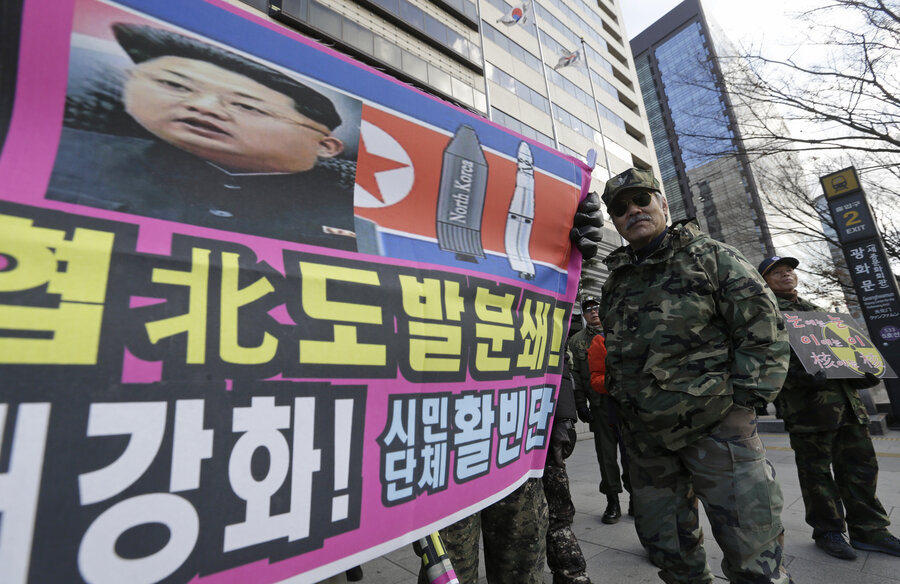Tensions between Koreas rise after nuke test by North
Loading...
| SEOUL, South Korea
North Korea trumpets a hydrogen bomb test. South Korea responds by cranking up blasts of harsh propaganda from giant green speakers aimed across the world's most dangerous border. Now Pyongyang warns of war, even as it reportedly has started its own broadcasts.
As the world looked Saturday for ways to punish the North over a nuclear test that pushes Pyongyang closer to its goal of a nuclear-armed missile that can reach the U.S. mainland, the two Koreas have quickly slid into the kind of Cold War-era standoff that has defined their relationship over the past seven decades.
A top North Korean ruling party official's warning that the South's broadcasts have pushed the Korean Peninsula "toward the brink of war" is typical of Pyongyang's over-the-top rhetoric. But it is also indicative of the real fury that the broadcasts, which criticize the country's revered dictatorship, cause in the North.
Seoul resumed the cross-border broadcasts Friday for the first time in nearly five months. Pyongyang says the broadcasts are tantamount to an act of war. When Seoul Korea briefly resumed propaganda broadcasts in August after an 11-year break, Seoul says the two Koreas exchanged artillery fire.
South Korea's Yonhap news agency, citing an anonymous military source, reported late Saturday that the North had started its own broadcasts, presumably to keep its soldiers from hearing the South Korean broadcasts. The North's broadcasts were too weak to hear clearly on the South Korean side of the border. South Korean military officials wouldn't confirm the Yonhap report.
Besides the "brink of war" comment, Workers' Party Secretary Kim Ki Nam said in comments broadcasts on state TV on Friday that Pyongyang's rivals are "jealous" of the North's successful hydrogen bomb test.
Many outside governments and experts question whether the blast was in fact a powerful hydrogen test. As The Monitor's Peter Grier reported earlier this week, the US government's analysis of early data shows that North Korea's test was not consistent with a hydrogen bomb:
To the US, “hydrogen bomb” means a two-stage fission-fusion weapon type developed by the major nuclear powers. These are fantastically difficult to develop and produce but can produce yields in the hundreds or thousands of kilotons.
North Korea did not explode one of those – or if it did, it fizzled, according to David Albright, a nuclear expert and founder of the Institute for Science and International Security.
South Korean troops, near about 10 sites where loudspeakers started blaring propaganda Friday, were on the highest alert, but have not detected any unusual movement from North Korea along the border, said an official from Seoul's Defense Ministry, who refused to be named, citing office rules.
The South's Yonhap news agency said Seoul had deployed missiles, artillery and other weapons systems near the border to swiftly deal with any possible North Korean provocation. The ministry did not confirm the report.
Officials say broadcasts from the South's loudspeakers can travel about 10 kilometers (6 miles) during the day and 24 kilometers (15 miles) at night. That reaches many of the huge force of North Korean soldiers stationed near the border, as well as residents in border towns such as Kaesong, where the Koreas jointly operate an industrial park that has been a valuable cash source for the impoverished North.
Seoul also planned to use mobile speakers to broadcast from a small South Korean island just a few kilometers (miles) from North Korean shores.
While the South's broadcasts also include news and pop music, much of the programming challenges North Korea's government more directly.
"We hope that our fellow Koreans in the North will be able to live in a society that doesn't invade individual lives as soon as possible," a female presenter said in parts of the broadcast that officials revealed to South Korean media. "Countries run by dictatorships even try to control human instincts."
Marathon talks by the Koreas in August eased anger and stopped the broadcasts, which Seoul started after blaming North Korean land mines for maiming two soldiers. It might be more difficult to do so now. Seoul can't stand down easily, some analysts say, and it's highly unlikely that the North will express regret for its nuclear test, which is a source of intense national pride.
Responding to the bomb test, U.S. Secretary of State John Kerry urged China, the North's only major ally and biggest aid provider, to end "business as usual" with North Korea.
Diplomats at a U.N. Security Council emergency session pledged to swiftly pursue new sanctions. For current sanctions and any new penalties to work, better cooperation and stronger implementation from China is seen as key.
The South Korean and U.S. militaries also discussed the deployment of U.S. "strategic assets," Seoul's Defense Ministry said. Officials refused to elaborate, but the assets would likely include B-52 bombers, F-22 stealth fighters and nuclear-powered submarines.
After North Korea's third nuclear test, in 2013, the U.S. took the unusual step of sending its most powerful warplanes to drills with South Korea in a show of force. B-2 and B-52 bombers are capable of delivering nuclear weapons.
It may take weeks or longer to confirm or refute the North's claim that it successfully tested a hydrogen bomb, which would mark a major and unanticipated advance for its still-limited nuclear arsenal. Outside experts are skeptical the blast was a hydrogen bomb, but even a test of an atomic bomb would push North Korea closer to building a nuclear warhead small enough to place on a long-range missile.
The Korea Institute of Nuclear Safety said a small amount of radioactive elements was found in air samples collected from the peninsula's eastern seas after the blast, but the measured amount was too small to determine whether the North had really detonated a nuclear device. The institute will continue to collect and analyze more samples.







